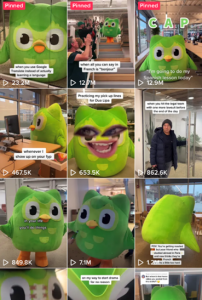Gen Z are already a powerful force, they are the new generation of consumers and as the economy bounces back, their influence and spending grows every day. Naturally brands are looking to engage this demographic but this comes with its own challenges. When it comes to marketing to Gen Z the ‘Who, What and Why?’ are more important than ever.
Who is Advertising?
A study completed by Morning Consult shows the average trust rating for major institutions among Gen Z has dropped to 46 percent. So how do brands go about winning back that trust that is fundamental between a brand and consumer? A good starting point is by looking how a brand interacts with their audience and showcases brand personality in way that is relevant and engaging.
A great example of a brand that does this well is Duo Lingo, the language learning app with the slightly intimidating owl mascot, Duo. Their success on Tik Tok, Gen Z’s platform of choice, has been phenomenal with over 2.5 million followers. This success is based on a strategy that priorities entertainment. The brand focuses on maintaining a personality that humanises their business through their mascot, listening to their audience by learning through their comments section and not being afraid to leverage trends. Zara Parvez from Duolingo stated “The key to the team’s success is that the account is less about selling Duolingo to TikTok audiences, who notoriously don’t want to be sold to, but entertaining them.” No huge surprise then that their content can rack up anywhere up to 23 million views per post. The key takeaway here is don’t try too hard when it comes to selling to Gen Z – this is a major turn off for this generation!

What do they stand for?
Community and social connection are at the heart of what Gen Z want. As social movements gain notoriety and support quicker, corporate responsibility and sustainability become more in focus, brands are now expected to do their bit for the wider world.
90% of Gen Z consumers surveyed state that sustainability plays a role in their daily lives with 54% saying they are willing to spend 10% more on sustainable products. That’s a lot of stats but what it represents is a shift in expectations from this generation which means that purpose needs to be at the center of brand communications.
Why am I seeing this?
A 2020 survey found that 81 per cent of Gen Z wanted more privacy online and that ultimately poses a problem for digital marketers across the globe. This is a social media savvy generation that understands and is native to the digital world. They have the knowledge to curate social feeds specifically to their own tastes, and engagement is a currency reserved only for the content that they really care about.
So how do we reach them in a paid and organic way that helps them to trust and encourages them to engage?
As mentioned, building trust could come back to connecting to causes that your audience care about, or creating content in a way that connects with them on personal level. Another area to consider could be to work with a relevant content creator who shares your target demographic. Despite influencer marketing being under its own scrutiny, a recent survey by Nielsen showed that 92% of Gen Z customers trust an influencer more than a traditional advertisement.
An example of a great influencer partnership was when the NHS worked with a social media influencer to create content for their own channels to promote Covid-19 vaccinations. With all the misinformation about vaccines, I think this was a great way for the NHS to reach, engage with and build trust with a Gen Z audience on both Instagram and TikTok.


Activism, brand trust and digital understanding are key to this new generation of consumers. If you want Gen Z to reward you with their business and their loyalty, you need to understand and act on their expectations.





